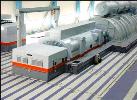Judge Remands Two Issues on Plant Washington's Permit
POWER4Georgians will need to provide more data and analysis on particulate matter and carbon monoxide emissions.
Administrative Law Judge Ronit Walker has granted POWER4Georgian's request to remand two issues related to certain emissions levels contained in the Plant Washington permit back to the Georgia Environmental Protection Division and the consortium for modification.
POWER4Georgians, a consortium of Georgia electric membership cooperatives (EMCs) that have partnered to develop and implement a comprehensive energy strategy, is developing new baseload power facilities, such as Plant Washington and Plant Ben Hill.

The consortium does not have to redo the entire permit application; it must address the two specific points related to particulate matter-filterable and carbon monoxide emissions, which the judge said required more extensive data and analysis than was contained in Plant Washington’s permit.
“There are more than 100 different conditions in this permit, and of those, only two required further analysis, which speaks to the thoroughness of our application,” said Dean Alford, spokesperson for POWER4Georgians. “We know what needs to be done to address Judge Walker’s concerns, and we look forward to addressing her concerns as soon as possible.”
For members of the EMCs, the best news is that the delay resulting from this action by opponents is negligible and the Plant Washington project is moving forward on a good schedule, according to a press release from the consortium.
“The opponents who appealed the permit have been focused on trying to prevent Plant Washington, yet they have no plans for how Georgia’s energy needs are going to be met in the years to come,” Alford added. “They have been repeatedly encouraged to come up with a viable plan to provide affordable and reliable electric service for the average Georgia citizen and have yet to do so. At the same time they don’t seem to be willing to unplug their cellphones, their computers, their air conditioners, their refrigerators, or big screen TVs.”
Plant Washington will feature technologically advanced emissions controls. In fact, the consortium stated, the plant’s overall emissions profile will be among the lowest that has ever been proposed for a coal-fired power generation facility anywhere in the United States.
When construction begins, the plant is expected to take approximately four years to build and will create up to 1,600 professional construction and skilled trade jobs. When complete, Plant Washington is expected to create between 120 and 130 new jobs onsite, as well as an additional 200 to 300 new secondary jobs in supporting businesses and industries in and around Washington County.